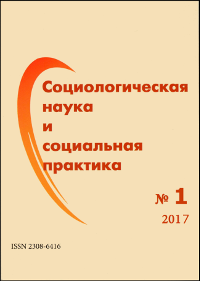Становление института независимой оценки качества: вопросы и перспективы развития
Аннотация
Литература
Голубева А. А., Соколова Е. В. Инновации в общественном секторе: введение в проблему // Вестник Санкт-Петербургского университета. Серия 8: Менеджмент. 2010. № 4. С. 28—57.
Зайцева А. С., Шувалова О. Р. Новые акценты в развитии инновационной деятельности: инновации, инициируемые пользователями // Форсайт. 2011. Т. 5. № 2. С. 16—32.
Зарубина Н. Н. Социокультурные и институциональные противоречия: вызовы для инновационного развития России // Социологическая наука и социальная практика. 2014. № 2. С. 5—22.
Ксенофонтова Х. З. Модель социальных инноваций — фактор развития потенциала управленческого персонала // Известия Пензенского государственного педагогического университета им. В. Г. Белинского. 2011. № 24. С. 326—330.
Краснопольская И. И., Мерсиянова И. В. Гражданское общество как среда производства и распространения социальных инноваций // Форсайт. 2014. Т. 8. № 4. С. 40—53.
Омонов Ж. К. Барьеры развития социальных инноваций // Журнал экономической теории. 2016. № 2. С. 189-193.
Полтерович В. М. Общество и реформы. Институциональные ловушки: есть ли выход? // Общественные науки и современность. 2004. № 3. С. 5-16.
Полтерович В. М. Искусство реформ. Лекция в рамках проекта «Публичные лекции “Полит.ру”». 15.06.2006. Стенограмма [Электронный ресурс] // Полит.ру URL: http://polit. m/article/2006/0 6/26/p olterovich/ (дата обращения: 09.023.2017).
Попов Е. В., Омонов Ж. К., Веретенникова А. Ю. Многопараметрическая классификация социальных инноваций // Вестник УРФУ. Серия: Экономика и управление. 2015. Т. 14. № 6. С. 836-867.
Приказ Минтруда России № 995 от 8 декабря 2014 г. «Об утверждении показателей, ха¬рактеризующих общие критерии оценки качества оказания услуг организациями социального обслуживания» [Электронный ресурс] // Министерство труда и социальной защиты РФ URL: http://www.rosmintrud.ru/docs/mintrud/orders/339 (дата обращения: 16.10.2016).
Рагозина Л. Г., Цацура Е. А. Независимая оценка качества оказания социальных услуг: первые результаты // Мониторинг общественного мнения: экономические и социальные перемены. Январь-февраль 2015 г. 2015. № 1 (125). С. 3-13.
Савинская О. Б., Дудченко О. Н., Мытиль А. В. Методический аудит независимой оценки качества в социальной сфере: возможности и ограничения // Журнал исследований социальной политики. Статья опубликована на сайте журнала в рубрике «в печати:» URL: https://jsps. hse.ru/data/2016/12/07/1113163268/JISP FV Savinskava Dudchenko Mvtil.pdf(дата обращения 18.02.2017)
Федеральный закон от 28.12.2013 № 442-ФЗ «Об основах социального обслуживания граждан в РФ». Статья 23.1. Независимая оценка качества оказания услуг организациями социального обслуживания [Электронный ресурс] // КонсультантПлюс URL: http://www. consultant.ru/law/hotdocs/30586.html (дата обращения: 16.10.2016).
Федотова В. Г. Социальные инновации как основа процесса модернизации общества // Вопросы философии. 2010. № 10. С. 3-17.
Battistella C., Nonino F. Open innovation web-based platforms: The impact of different forms of motivation on collaboration // Innovation: Management, Policy & Practice. 2014. Vol. 14. No 4. Р. 557-575.
Bund E., Hubrich D-K., Schmitz B., Mildenberger G., Krlev G. Paving the Way to Measurement - A Blueprint for Social Innovation Metrics. A Short Guide to the Research for Policy Makers (A deliverable of the project: «The theoretical, empirical and policy foundations for building social innovation in Europe» (TEPSIE), European Commission - 7-th Framework Programme). Brussels: European Commission, DG Research, 2013.
Morgan D. Integrating Qualitative and Quantitative Methods: A Pragmatic Approach. Thousand Oaks, CA: Sage Publications, 2013. 288 p.
Mulgan G., Tuckers S., Ali R., Sanders B. Social innovation: what it is, why it matters and how it can be accelerate. London: The Basingstoke Press, 2007.
Phils J. Rediscovering Social Innovations. Stanford: Stanford Graduate School of Business, 2009.
Shane S. Why Do Some Societies Invent More Than Others? // Journal of Business Venturing. 1992. № 7. P 29-46.








 Издатель: Федеральное государственное бюджетное учреждение науки
Издатель: Федеральное государственное бюджетное учреждение науки